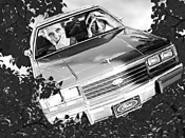
Pity poor Ford. The nation's second-largest carmaker has lost $6 billion over the past two years and received more bad press than any organization since the Huns. Its much-maligned Explorer may as well be dubbed the Rollover. The troubled Focus, unveiled just three years ago, already has been recalled a whopping 11 times for design defects. While a recent federal probe into Crown Victoria fuel-tank fires ended with no finding of fault against the company, the acrid stench of suspicion -- and pending litigation -- lingers. Oh, and don't forget the $5.7 billion Ford is spitting out to replace Firestone tires and repair flawed ignition systems.
But if all those safety-related headaches have company officials gulping Tylenol, they now could use a shot of morphine -- thanks to the Ohio Supreme Court.
In October, the court granted a new trial to Leon and Virginia Manigault, a Cleveland couple injured in a 1993 accident in their Crown Vic. They sued Ford in Common Pleas Court, alleging that a cruise-control glitch caused the '87 sedan to suddenly accelerate. When Leon flipped the ignition, they say, the car roared out of the driveway of their Kempton Avenue home. Some 200 feet later, it slammed into a neighbor's house. Leon fell into a semi-comatose state soon after; Virginia suffered a broken hip.
Denying that it designed a bum cruise control, Ford won a jury verdict in 1997 by arguing that Leon inadvertently hit the gas pedal. The company padded its case with expert testimony and a silent safety videotape that suggested a runaway car could be stopped with as little as 20 pounds of brake pressure.
A year later, a Common Pleas judge ordered a second trial, after blistering Ford for suppressing an internal study of 2,800 alleged incidents of unintended acceleration. Word of the investigation first surfaced in a similar suit in Arkansas, in which company engineers claimed they had been unable to duplicate cruise-control malfunctions. Judge Anthony Calabrese Jr. called it "fraudulent and unconscionable" for officials to disavow that such a glitch could cause an engine surge. An appeals court reversed his decision in 1999, ruling that the carmaker did not hide evidence.
As the case wound its way to the Supreme Court, Dateline NBC aired a story on sudden acceleration that featured the Manigaults. Ford provided the network with a copy of the same safety video shown at trial. Only this copy, to the surprise of the couple's lawyers, included audio -- and apparently refuted what Ford's experts asserted in court.
On the tape, NBC reported, a voice says that stopping a runaway car would take 175 pounds of brake pressure. That amounts to a sustained, pedal-to-the-floor stomp that Leon, 67 at the time of the accident, would have struggled to perform.
In granting a new trial, the Supreme Court blasted Ford's presentation of the video without sound as "seriously misleading." Safety advocates say the decision alerts plaintiffs' lawyers that sudden-acceleration suits -- which the auto industry wins almost by sheer habit -- are no longer a lost cause.
"This is significant," says Clarence Ditlow, head of the Center for Auto Safety in Washington, D.C. He predicts that the newly revealed audio could help revive dozens of old cases and spark hundreds of others -- along with more financial losses and publicity migraines for Ford. "We think their day of reckoning on sudden acceleration is coming."
Before the accident, Leon Manigault served as pastor of the Temple of God Church on East 105th, and he and his wife were foster parents. Now bedridden and unable to speak or feed himself, Leon requires 24-hour care, says Thomas Murray, one of the couple's three attorneys. (Virginia Manigault did not respond to interview requests.)
Murray could be considered the biggest road spike under Ford's wheels. The Sandusky lawyer has about a dozen sudden-acceleration cases pending against the carmaker in almost as many states. Last month, the U.S. Supreme Court upheld a $1.1 million verdict he won for a woman injured in 1991, when her new Aerostar van lurched out of control. A jury found the company negligent for its cruise-control design.
Ford attorney Michael O'Reilly says the carmaker "has not found evidence of multiple electrical malfunctions causing sudden, unintended acceleration." Yet Murray, whose spadework has unearthed thousands of company documents that detail its analysis of the problem, finds that as likely as a GM-Ford merger. "The catastrophe which befell the Manigaults is similar to what's happened to hundreds of other people who have been injured or killed in Ford-made cars."
Sudden acceleration has been a pox on the industry since the advent of cruise control in the late '70s. The epidemic peaked a decade later -- around the time Audis were rocketing through garage walls -- as thousands of drivers of every kind of car complained.
Automakers quieted the ruckus by fitting new vehicles with shift locks, a device that prevents a car from slipping into gear unless the brake is depressed. But despite arriving at that "Detroit, we have a problem" realization, and even as glitches persist in some newer models, companies still blame drivers -- and drivers only.
The claim might stand up against an elderly man like Leon Manigault, though his son, John, told Dateline that he saw brake lights flash as the car shot forward. But Ford officials deploy the same theory to dispute reports from Secret Service agents and cops, who say their Crown Vics and Econoline vans sometimes take off without warning. The reason for Ford's naked denial of liability: Corporate Math 101, says Virginia attorney Edgar Heiskell III.
"Why pay $6 billion or $8 billion doing a recall of a car or van when you might only have to pay out a couple hundred million in lawsuits?" says Heiskell, who's juggling a handful of cases against the company. "They've made that calculation."
Yet a 1989 study on sudden acceleration by the National Highway Transportation and Safety Administration also fingered driver error. Carmakers were cleared, and despite loads of fresh data on cruise-control and other mechanical failures uncovered since then, the agency refuses to reopen its probe.
"Anything can happen in one car," says NHTSA spokesman Tim Hurd. "But in looking at safety defects, there hasn't been a finding of a flaw that affects an entire model of car."
Meanwhile, a federal review of the NHTSA earlier this year found plenty of flaws within the agency. Chief among them: It's too slow to recall defective vehicles and too quick to accept industry excuses. Exhibit A was the 12,000 deaths related to SUV-rollover crashes during the '90s. According to the report, officials finally got to their feet only in response to scalding media coverage and class-action suits against carmakers. Chronic underfunding also has hamstrung the agency.
"NHTSA's study in '89 was meant to be the end-all analysis of sudden acceleration," says Sean Kane, spokesman for the Virginia-based research firm Strategic Safety. "It hasn't turned out that way, but other issues like rollovers have gotten bigger and receive more of their attention."
Adds Ken Baker, director of the Center for Public Safety at Northwestern University: "Most of the important information on sudden acceleration these days comes from lawsuits, not from the NHTSA."
Ford attorney O'Reilly disputes the charge by plaintiffs' lawyers that the carmaker still receives more than 100 complaints a month on sudden acceleration. But he refuses to provide company figures or explain why the video shown during the Manigaults' trial lacked sound. Instead, Ford officials insist -- in vaguely Nixonian fashion -- that written transcripts presented in court recount verbatim what experts said on the tape. They further contend that details regarding the brake pressure needed to stop a car have been misinterpreted.
Yet Justice Paul Pfeifer, who authored the Supreme Court's majority opinion, says jurors should make that call -- with the benefit of the tape's audio. "It's normal for the public to form an opinion about a case, even when they don't have all the information," he says. "But a jury shouldn't have to do that."
The court, which split 4-3 in siding with the Manigaults' appeal, two weeks ago denied Ford's request to reconsider its decision. The bad news adds to the company's other recent woes.
Cleveland is suing Ford over problems with the Crown Vics that make up most of its police fleet. The carmaker already has agreed to retrofit fuel tanks on 350,000 police cars nationwide because of concerns that the tanks burst into flames in rear-end crashes.
In October, the California Supreme Court upheld a $290 million punitive award against Ford for a Bronco II rollover crash that killed three people. If the award stands, it would rank as the largest against a carmaker in a single product-liability case.
Last month, Heiskell received a Virginia judge's permission to seek a punitive award "that would deter Ford from continuing to deny" that design flaws potentially cause sudden acceleration. He represents a woman who alleges that the cruise control on her '98 Lincoln Town Car failed to disengage as she exited a freeway; the car smashed into an embankment, injuring her and killing her teenage daughter.
Ford, like most über-corporations, tends to opt for confidential settlements instead of admitting guilt in big cases. Murray says he's unsure whether the Manigault family, including the couple's six children, would agree to such a deal. Their frustration with Ford may compel them to risk losing a trial for the chance to win an award that makes headlines. If that happens, Ditlow says, company officials can take a turn pointing fingers at themselves.
"Ford's trying to rehabilitate its credibility, and none of this publicity is helping. But they only have themselves to blame."













